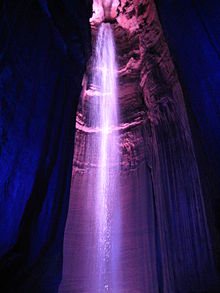Subterranean waterfall
Appearance


A subterranean waterfall, tierous waterfall, or underground waterfall is a waterfall located underground, usually in a cave or mine. They are a common feature in cave systems where there are vertical or near vertical geological structures for the weathering process to exploit, and sufficient gradient between the sink and the rising.[1][2] Notable examples include Ruby Falls, 44 metres (144 ft) high, in Chattanooga, Tennessee[3] and Gaping Gill in the Yorkshire Dales, UK with a fall of 98 metres (322 ft). The highest known subterranean waterfall is in Vrtoglavica Cave in Slovenia, and is at least 400 metres (1,300 ft).[4]
See also
[edit]References
[edit]- ^ Kevin Adams (1 June 2002). Waterfalls of Virginia and West Virginia: A Hiking and Photography Guide. Menasha Ridge Press. p. 32. ISBN 978-0-89732-414-4.
- ^ Waltham, Tony; Murphy, Phil (2013). Waltham, Tony; Lowe, Dave (eds.). Caves and Karst of the Yorkshire Dales. Buxton: British Cave Research Association. p. 136. ISBN 978-0900265-46-4.
- ^ "Tennessee's Spectacular Underground Waterfall". The Weather Channel. 21 March 2014. Retrieved 4 April 2016.
- ^ Pavils, Gatis (7 March 2013). "Vrtiglavica Cave and Waterfall". Wondermondo. Retrieved 4 April 2017.
Wikimedia Commons has media related to Subterranean waterfalls.
